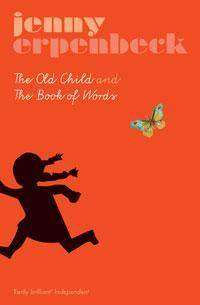Book Review – THE BOOK OF WORDS by Jenny Erpenbeck
 The Book of Words Synopsis:
The Book of Words Synopsis:
A child is found standing on the street, with an empty bucket in her hand, and no memory of her name, her family or her past. Elsewhere, a girl grows up surrounded by familiar faces – a wet nurse, a piano teacher, a gardener, a best friend and a distant mother – but soon finds them slipping mysteriously from her life. In the company of these girls, we are compelled to tread the uncertain and spikey terrain of memory, where words are dropped like clues to reveal what has been hidden, forgotten or erased. (Booktopia)
Translated from the original German by Susan Bernofsky
BOOK REVIEW
The depth of meaning to be found within Jenny Erpenbeck’s The Book of Words, the latter story referenced in the synopsis for this omnibus, should not be extrapolated from its page length. This dense little novella is a challenging read, but one I am glad I persisted with.
In his review for The Guardian, Patrick Ness describes The Book of Words as ‘an unsettling, slowly revealed fable of oppression and fascism’.
It is heavy subject matter conveyed obliquely through child eyes. The inner thoughts of the nameless narrator at first appear deeply philosophical,
What are my eyes for if they can see but see nothing? What are my ears for if they can hear but hear nothing? Why all this strangeness in my head?
but it is soon evident that she has led a life so sheltered from what is happening where she lives that her exploratory thoughts are spurned from naivety rather than wisdom. The reader is left to infer what lies just outside the narrators sight and understanding, and indeed why the narrator is being sheltered to the extent she is.
As such the narrator is highly unreliable, and the clues that can lead the reader to understanding the broader story at play are only hinted at. Add to this, prose filled with repetition, abstraction and surrealism, and you begin to understand the depth of thought Erpenbeck expects of her readers.
We put cake into our mouths, it vanishes there, mouth, eyes and nose: holes, the beginnings of paths, no one knows quite where they lead. Stomach, my mother says, I’ve never seen my stomach from the inside, but at least what I eat comes out again on the other end, but what about the things I put into my eyes, where do they go, are all of them supposed to fit inside my head, even if I were to stack them up the way our housekeeper stacks the laundry, folding it and placing one piece atop the other, there still wouldn’t be room, I don’t think, and therefore I keep saying all the things I’m seeing so they’ll change course inside my head and go out again through my mouth.
And this leads me to what is in my opinion a weakness of this title – as helpfully explained by translator Susan Bernofsky in the Afterword – the reader requires an understanding of what went on in the East Germany of Jenny Erpenbeck’s childhood to unlock much of this story’s deeper meaning. For that reason, I would only recommend The Book of Words to more mature readers.
I appreciated the artistic qualities and originality of The Book of Words by Jenny Erpenbeck, but at times ‘mental exercise’ was a better descriptor of my reading experience than ‘mental stimulation’.
BOOK RATING: The Story 3 / 5 ; The Writing 4 / 5
This review counts towards my participation in German Literature Month hosted by Lizzy and Caroline.
Disclosure: If you click a link in this post we may earn a small commission to help offset our running costs.
Have you read The Book of Words ? Do you want to?
Join the discussion below.
BOOK DETAILS: The Book of Words by Jenny Erpenbeck ( Booktopia | Amazon )
Genre: Mystery, Literature, Translation
Author Information: Jenny Erpenbeck (born 1967 in East Berlin) is a German director and writer. In addition to The Book of Words her published fiction translated into English includes Visitation and The Old Child.
Susan Bernofsky, one of the preeminent translators of German-language literature, teaches literary translation in the MFA Writing Program of the Columbia University School of the Arts, where she serves as Director of Literary Translation at Columbia, and chairs the Translation Committee of the PEN American Center.
Other reviews of The Book of Words: The Asylum; The Brooklyn Rail


